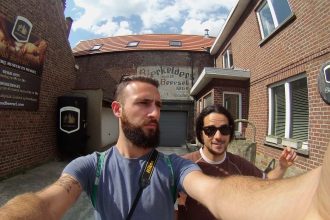Barrique Brewing & Blending – Joel – Nashville
Ormai non ho più dubbi. Si può avere un progetto di produzione di birre spontanee veramente ovunque. Siamo nell’area industriale dell’East Nashville, Tennessee, tra un magazzino di idraulica e uno shop di pneumatici.
Mi viene in mente una infiammata discussione che ebbi diversi anni fa con Teo Musso (uno dei pionieri della birra artigianale italiana) nel suo pub di Piozzo. Ancora non mi definivo neanche un birraio, ma di una cosa ero certo – si possono produrre birre a fermentazione spontanea dovunque, non solo nel Pajottenland o sotto il tetto di Cantillon a Bruxelles. E alla sua domanda:
“e tu, giovane aspirante birraio, che tipologie di birre vorresti fare?”,
e io, con il mio fare a volte un po’ troppo sprezzante:
“Fermentazioni Spontanee!”

Ma lui non era molto d’accordo con la mia affermazione, anzi, mi rispose anche un po’ incazzato, come se volessi mancare di rispetto ai suoi “amici di famiglia” Van Roy, proprietari da generazioni di uno dei più famosi birrifici al mondo di birre a fermentazione spontanea – il leggendario Cantillon. Mi redarguì, cercando di stroncare i miei sogni di un futuro illuminato da fermentazioni spontanee in ogni angolo del pianeta. Ma io rimasi delle mie idee, e sei anni dopo, Cantina Errante è quella che è. Come mi piace sempre ricordare alla gente: “te l’avevo detto”.
Ma, tornando a parlare di Barrique Brewing & Blending, sapevo che aveva aperto nel 2019, che era uno dei pochi birrifici a dilettarsi con birre a fermentazione spontanea a Nashville, e secondo Matthew, il bartender che ho conosciuto a Monday Night Brewing, fanno tra le lager più buone in città. Tutte le loro birre hanno una cosa in comune: ognuna passa da una botte, almeno una volta, che sia per due settimane, due mesi, due anni o chissà quanto. Mi piacciono in birrifici che seguono strettamente la loro filosofia produttiva e la loro idea dietro al progetto. Si chiamano Barrique, e giustamente ognuna delle loro birre deve toccare il legno, e così è. Sì, anche una pils da 3.5%.

Joel, birraio e proprietario del birrificio, mi ha raccontato e guidato alla scoperta dei suoi metodi non convenzionali, ma che per lui, invece, sono semplicemente naturali. Questa è la differenza tra un genio della birrificazione, e chi s’improvvisa. Lui non lo fa per uno scopo preciso, non lo fa per la fama o per i soldi (ha pure un secondo lavoro), lo fa perché sente di doverlo fare. È una necessità d’espressione. E io, lo capisco a pieno.
Non segue regole prese dai libri, utilizza i metodi, le materie prime e gli strumenti che ha a disposizione per creare. Avete mai sentito qualcuno che ha utilizzato solamente i piccioli delle fragole?
E lagerizzare birre pulite in barrique, con un metodo di contropressione ideato da lui per mantenere un’atmosfera sempre carica di CO2?
Non avevo mai visto un metodo di classificazione delle botti e delle birre come il suo. A colpo d’occhio ti sa dire che birra c’è dentro ad ognuna delle sue 600 botti, quando è stata fatta, se c’è ancora qualche ingrediente all’interno, quando è stata travasata, da che botte ecc…
Alcune delle sue birre subiscono cinque o sei processi di taglio o blend, altre hanno avuto aggiunte della stessa frutta per anni consecutivi, ed ancora non sono state confezionate, perché ancora non hanno raggiunto la loro forma finale.
Tutti queste particolarità mi hanno fatto capire che non mi trovavo davanti ad un birrificio qualunque, e questi, sono solo alcuni degli spunti che mi ha dato nelle poche ore che abbiamo passato insieme. Vengo ancora preso di sorpresa certe volte e dopo ormai quasi dieci anni di esperienza in questo campo, mi fanno capire che, la creatività non ha una fine. E che, chi riesce a mettere in pratica le proprie idee può creare risultati incredibili.

Parlando di risultati incredibili, la loro Petite Biere De Coupage, penso sia la table beer più buona che abbia mai assaggiato. Un blend di una birra di due settimane, una di un anno e una di due anni, da 3.0%. Spero la possiate assaggiare prima o poi.
Vi lascio con una sua massima:
“Il livello di cura dei minimi dettagli che puoi raggiungere con produzioni artigianali di piccole dimensioni, è ciò che crea prodotti fuori dalla norma”.
(e mi ha detto questa frase spiegandomi come lui vuole che, l’etichetta, il tappo in sughero con il suo marchio e la gabbietta siano tutte orientate perfettamente allo stesso modo – un livello d’attenzione maniacale, che è ciò che lo contraddistingue).
Grazie Joel, ti aspetto in Italia prima o poi.

ENG Version
I don't have doubts anymore. You can have a spontaneous beer project really anywhere. We're in the industrial area of East Nashville, Tennessee, between a plumbing warehouse and a tire shop.
I recall a heated discussion I had several years ago with Teo Musso (one of the pioneers of Italian craft beer) in his pub in Piozzo. I didn't even call myself a brewer yet, but I was sure of one thing - you can brew spontaneous beers anywhere, not just in Pajottenland or under the roof of Cantillon in Brussels. And to his question:
"and you, young aspiring brewer, what kind of beers would you like to make?",
and I, with my sometimes a little too cocky answers:
"Spontaneous Fermentation!"
He didn't agree at all with my statement; on the contrary, he even answered me a little pissed off, as if I wanted to disrespect his "family friends" Van Roy, owners of one of the world's most famous breweries of spontaneously fermented beers for generations - the legendary Cantillon. He rebuked me, trying to nip my dreams of a future illuminated by spontaneous fermentations in every corner of the planet. Clearly, I didn't listen to him, and six years later, Cantina Errante is what it is. As I always like to remind people: "I told you."
But, let's talk about Barrique Brewing & Blending. I knew it had opened in 2019 and was one of the few breweries to dabble in spontaneous brewing beers in Nashville. According to Matthew, the bartender I met on Monday Night Brewing, they make some of the best lagers in town. All their beers have one thing in common: each goes through a barrel, at least once, for two weeks, two months, two years, or who knows how much. I like the breweries that closely follow their production philosophy and the idea behind the project. They're called Barrique, and rightly each of their beers has to touch wood, and so it is. Yes, even a 3.5% pils.
Joel, brewer and owner of the brewery, guided me to discover his unconventional methods, which are simply natural for him. This is the difference between a genius of brewing and one who improvises. He doesn't do it for a specific purpose. He doesn't do it for fame or money (he also has a second job). He does it because he feels he has to do it. It is a necessity of expression. And I fully understand that.
He does not follow the rules taken from books; he uses the methods, raw materials and tools he has at his disposal to create. Have you ever heard of anyone using only strawberry petioles?
And maturing clean lager beers in barrique, with a counterpressure method designed by him to maintain an atmosphere always charged with CO2?
I had never seen a method of classifying barrels and beers like his. At a glance, he can tell what beer is inside each of its 600 barrels, when it was made, if there is still some ingredient inside, when it was racked, by what barrel, etc...
Some of his beers undergo five or six cutting processes or blends; others have had additions of the same fruit for consecutive years, and have not yet been packaged, because they have not yet reached their final form.
These peculiarities made me realize that I was not in front of an ordinary brewery, and these are just some of the ideas he gave me in the few hours we spent together. I am still surprised sometimes, and after almost ten years of experience in this field, they make me understand that creativity has no end. And that who can put their ideas into practice can create incredible results.
Speaking of incredible results, their Petite Biere De Coupage, I think, is the best table beer I've ever tasted. A blend of a two-week, one-year, and two-year, 3.0% beer. I hope you can try it sometime.
I leave you with one of his mantras:
"The level of attention to detail you can achieve with small craft productions is what creates products out of the norm."
(He told me this sentence, explaining how he wants the label, the cork with his trademark, and the cage to be perfectly oriented in the same way - a level of maniacal attention that characterizes him).
Thank you, Joel; I'll wait for you in Italy sooner or later.







Lascia un commento